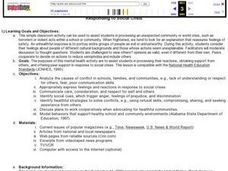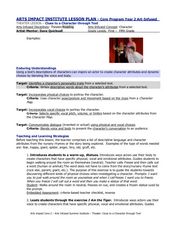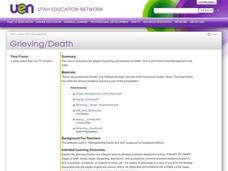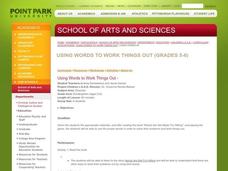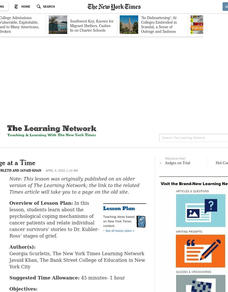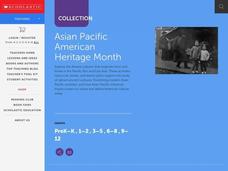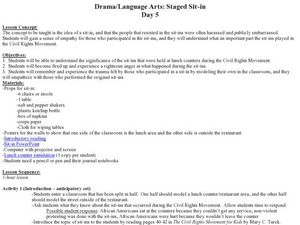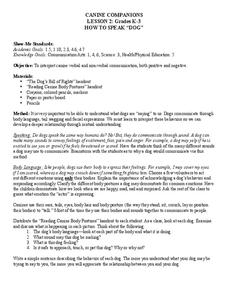Harper Collins
The World of Ramona
Bring the fun and whimsy of Beverly Cleary into your classroom with a teaching guide created to accompany the Ramona series. The guide offers several ideas for classroom use, including independent reading, reading aloud, and literature...
Curated OER
Using Words to Work Things Out
Learners study conflict resolution. In this conflict resolution lesson, students read a book about anger and watch a puppet skit about how to handle conflicts. Learners create their own puppet skit about conflict resolution.
Curated OER
Responding to Social Crisis
Young scholars, through discussion, identify ways to cope with and process unexpected community or world crisis, such as terrorism or violent acts within a school or community.
Nemours KidsHealth
Sportsmanship: Grades 3-5
Students complete activities regarding good sportsmanship. For this sportsmanship instructional activity, students discuss winning, losing, and cheating. They participate in Sportsmanship scenarios and discuss what they would do in each...
Nemours KidsHealth
Sportsmanship: Grades K-2
Students discover how to play sports fairly by role playing sports scenarios in class. In this sportsmanship lesson, students participate in a charades activity in which they act out a random event while the class decides if this...
Curated OER
Clues to a Character through Text
Readers will read a text and fill out a character map based on the characters in that text. They will explore different qualities of each character for their map. this can be modified to support younger learners. They will learn about...
Curated OER
Octopus Project: Ceramics
Kids make an octopus out of clay. They practice their sculpting and modeling skills such as pinch pot and slurry technique while sculpting an octopus.
Curated OER
Grieving/Death
Students discuss the stages of grieving and reactions to death. They list the steps of the grieving process and how to develop a positive adjustment to loss. They study The 'Rape Myths' key (from the Sexual Violations activity) as part...
Curated OER
Using Words to Work Things Out
Learners explore classroom community building. In this character development and community building lesson, students listen to Hands Are Not for Hitting and generate a class list of positive ways to handle classroom conflicts. Learners...
Curated OER
One Stage at a Time
Students explore the psychological coping mechanisms of cancer patients and relate individual cancer survivors' stories to Dr. Kubler-Ross' stages of grief. They use first-person accounts, discussion and journals to explore these concepts.
Curated OER
American Revolution: Attempting to Resolve Disputes by Communication
Students study conflicts over taxation. In this American Revolution lesson, students research the taxes imposed on the colonists by the British and determine how the colonists attempted to abolish the taxes through non-violent protests....
Curated OER
Japanese American Baseball in the Camps
Students study Japanese American internment camps. In this American history lesson, students compare and contrast the camp internees' experiences with with team sports-related challenges students have encountered. Students discuss team...
Curated OER
Reformation and Civil Wars of Religion in 16th Century France
Students discover details about the Reformation. For this French history lesson, students view a PowerPoint presentation about the religious wars that took place in the country and within Europe. Students take notes on the presentation...
Curated OER
Kandinsky Color Studies
Students study the artist Wassily Kandinsky as well as his art and and music. In this art appreciation instructional activity, students view a variety of Kandinsky's work and circular color studies. Students relate the use of...
Curated OER
Staged Sit-in
Students watch a PowerPoint presentation that includes pictures of a sit-in and participate in a simulated sit-in. In this sit-in lesson, students perform a sit-in skit based on The Civil Rights Movement for Kids by Mary C....
Curated OER
Catholic Church Hierarchy
In this Catholic Church and Protestant Reformation study guide worksheet, students read a brief overview pertaining to the time period in English history and then respond to 5 reflection questions.
Curated OER
Martin Luther
In this Martin Luther study guide worksheet, students read a brief overview pertaining to the man and then respond to a reflection question.
Curated OER
Canine Companions
Students interpret canine verbal and non-verbal communication. In this dog communication lesson, students discuss dog communication through bark and body language. Students study the 'reading canine body postures' worksheet and write...
Curated OER
Current Spanish History 1900-present
Tenth graders study the Spanish Civil War. In this World History lesson, 10th graders analyze famous paintings. Students compare and contrast the government of the United States with that of Spain.
Nemours KidsHealth
Conflict Resolution: Grades 3-5
Young scholars analyze concepts related to health promotion and conflict resolution. In this character education lesson, students answer discussion questions about resolving conflicts. Young scholars complete a conflict resolution...
Curated OER
I Have Emotions
Students read books and discuss different emotions that they have. In this emotions lesson plan, students make different facial expressions to that express specific emotions and role play emotions.
Curated OER
Four Immigrant Groups: Their Lives and Music
Fourth graders examine the experiences of four immigrant groups. Class members brainstorm a list of misconceptions of those groups and discuss if these perceptions are still present today. Using maps, groups locate the countries of...
Curated OER
Houghton Mifflin Social Studies/Chapter 11, Lesson 1: California in Wartime (pp. 250-253)
Fourth graders explore the crisis of Japanese Americans during World War II. The benefits of the California economy are explored. The lesson has a discussion portion that is culturally relevant for many types of students.
Curated OER
Scientific Inquiry
Middle schoolers make inferences about what activities occur at different places in school. They form a hypothesis as to how space is used. They simulate how archeaologists explore past people by designing and conducting a research project.




